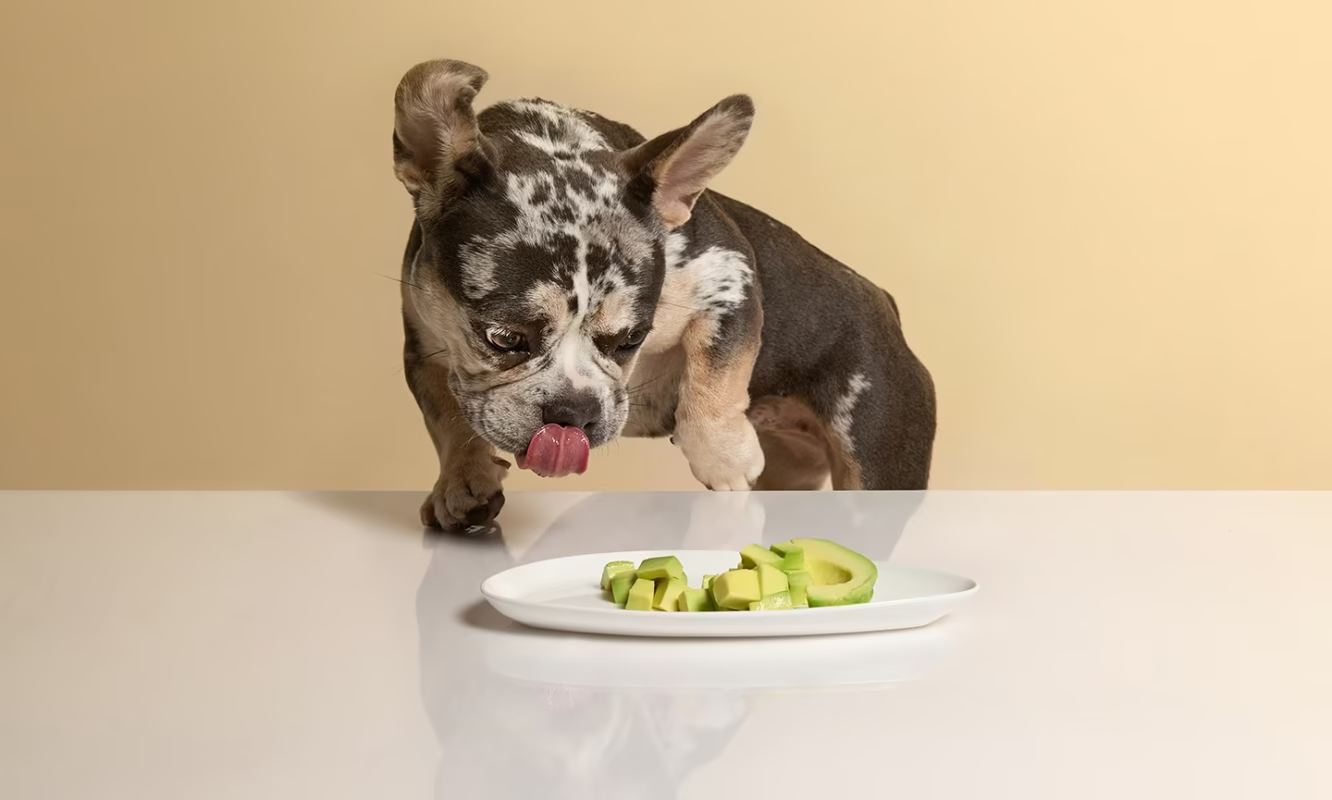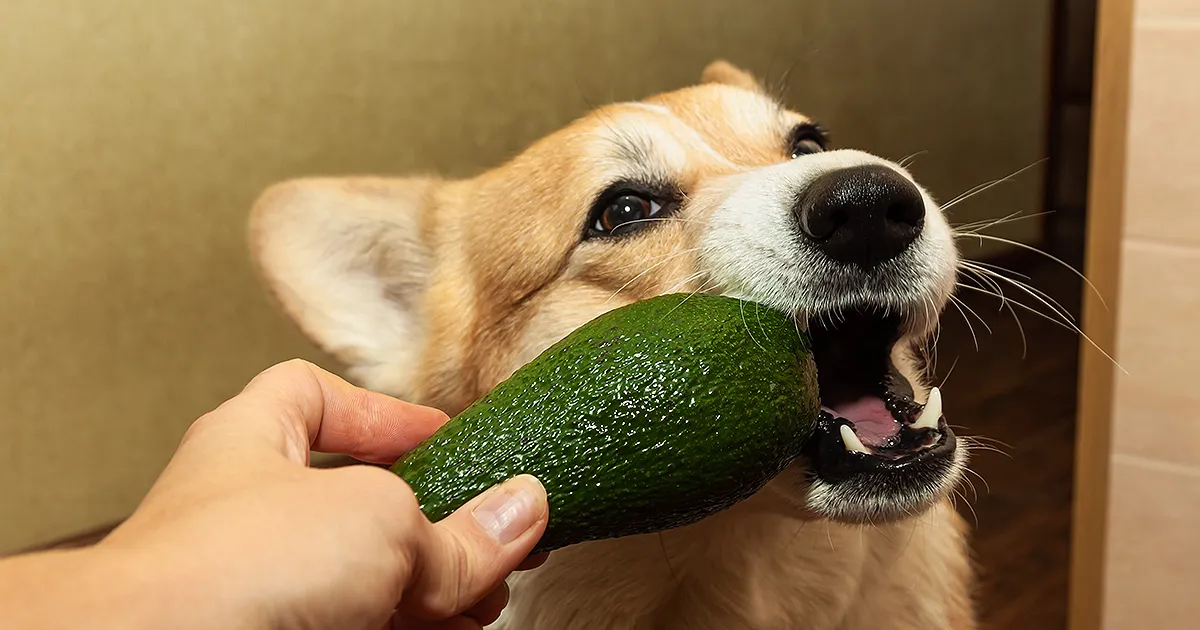Can Dogs Eat Avocado: Benefits, Risks & Safety Tips | 2025
Can dogs eat avocado? Discover the benefits, risks, and safe feeding tips. Learn how to recognize symptoms of persin toxicity and consult your vet for guidance.
You’re slicing an avocado for your salad when a piece falls to the floor, and your dog gobbles it up in a flash. Panic sets in – can dogs eat avocado? We’ve all been there, and it’s a question that’s become increasingly relevant as avocado consumption in the U.S. has tripled since 2001.
While avocados are packed with nutrients for humans, they contain a compound called persin that can be harmful to some animals. But what about our canine companions? In this text, we’ll jump into the facts about dogs and avocados, exploring the potential risks and benefits. We’ll also provide guidance on what to do if your furry friend accidentally indulges in this trendy fruit. Stay tuned as we unravel the truth about dogs and avocados, helping you make informed decisions about your pet’s diet.
Can Dogs Eat Avocado: Understanding the Risks and Benefits
While dogs can consume small amounts of avocado flesh, it’s crucial to understand the potential risks and benefits associated with this fruit. Let’s explore the nutritional value and potential dangers of avocados for our canine companions.
Nutritional Value of Avocados for Dogs
Avocados offer several nutrients that can benefit dogs when consumed in moderation:
- Vitamins A, C, E, and B6: Support skin, coat, bone, and eye health
- Omega-3 and omega-6 fatty acids: Promote a shiny, healthy coat
- Fiber: Aids digestion and supports gut health
- Antioxidants: Help fight various diseases
- Potassium: Essential for proper muscle and nerve function
Even though these benefits, it’s important to note that dogs can obtain these nutrients from other, safer sources specifically formulated for their dietary needs.
The Dangers of Persin Toxicity
Persin, a fungicidal toxin found in avocados, poses potential risks to dogs:
- Present in leaves, skin, pit, and flesh (in lower amounts)
- Can cause vomiting, diarrhea, and gastrointestinal upset
- May lead to myocardial damage in severe cases
- Dogs are more resistant to persin than other animals, but large amounts can still be harmful
Additional risks include:
- Choking hazards: The pit can cause blockages in the digestive tract
- High fat content: May lead to pancreatitis in some dogs
To minimize risks, remove the skin and pit, and only offer small amounts of ripe avocado flesh as an occasional treat. Always monitor your dog for any adverse reactions when introducing new foods.
Potential Health Hazards for Dogs
Feeding avocados to dogs presents several health risks that pet owners should be aware of. While some parts of the avocado are more dangerous than others, it’s crucial to understand the potential hazards associated with this fruit.
Choking and Internal Blockage Risks
The avocado pit poses a important choking and internal blockage risk for dogs. Due to its size and hardness, the pit can easily become lodged in a dog’s throat or digestive tract. If swallowed, it may cause an obstruction in the esophagus, stomach, or intestines, leading to severe complications. These blockages often require surgical intervention to remove the pit and can be life-threatening if not addressed promptly. Also, the pit’s sharp edges can cause internal injuries as it passes through the digestive system. To prevent these risks, always remove the pit before considering offering any avocado to your dog, and ensure it’s kept out of their reach.
Excessive Fat Content Concerns
Avocados are known for their high fat content, which can be problematic for dogs. While healthy fats are essential in a dog’s diet, the excessive amount found in avocados can lead to several health issues. Consuming too much fat can cause gastrointestinal upset, including vomiting and diarrhea. More seriously, it may trigger pancreatitis, an inflammation of the pancreas that can be acute or chronic.
Pancreatitis in dogs is painful and potentially life-threatening, often requiring hospitalization and intensive treatment. The high calorie content of avocados can also contribute to weight gain and obesity in dogs, leading to a host of other health problems. For these reasons, it’s best to limit or avoid giving avocados to dogs, especially those prone to digestive issues or weight problems.
Safe Ways to Feed Avocado to Dogs
While dogs can eat avocado in moderation, it’s crucial to follow exact guidelines to ensure their safety. Here are some safe ways to incorporate avocado into your dog’s diet:
Recommended Portions and Frequency
When feeding avocado to dogs, it’s essential to control portions and frequency. Offer only small amounts of ripe avocado flesh as an occasional treat. Start with a few small pieces, about 1-2 teaspoons for small dogs or 1-2 tablespoons for larger breeds. Introduce avocado gradually and observe your dog for any adverse reactions. Limit avocado treats to once or twice a week at most. Always remove the skin and pit before serving, as these parts contain higher concentrations of persin and pose choking hazards. Consult your veterinarian before adding avocado to your dog’s diet, especially if they have exact health conditions or dietary needs.
Avocado Oil as an Alternative
Avocado oil offers a safer alternative to whole avocados for dogs. Unlike the fruit, avocado oil doesn’t contain persin and is considered non-toxic to dogs. It’s rich in omega-3 fatty acids and vitamin E, which can help reduce inflammation and promote skin and coat health. But, avocado oil is still high in fat, so use it sparingly.
Add a small amount, about 1/4 teaspoon per 10 pounds of body weight, to your dog’s food once or twice a week. Always consult your veterinarian before introducing avocado oil to your dog’s diet. While avocado oil can be beneficial, it’s not a substitute for a balanced diet. Use it as a supplement rather than a primary food source for your canine companion.
What to Do If Your Dog Eats Avocado
If your dog consumes avocado, it’s essential to stay calm and assess the situation. The following information will guide you on what symptoms to watch for and when to seek veterinary care.
Symptoms to Watch For
Keep an eye out for these signs after your dog eats avocado:
- Vomiting
- Diarrhea
- Loss of appetite
- Lethargy
- Abdominal pain or discomfort
- Difficulty breathing
- Coughing
- Irregular heartbeat
Monitor your dog closely for 24-48 hours after avocado consumption. If you notice any of these symptoms, especially if they persist or worsen, contact your veterinarian immediately.

When to Contact Your Veterinarian
Contact your vet immediately if:
- Your dog ingested a large amount of avocado
- Your dog ate the pit, skin, or leaves
- Your dog shows any of the symptoms listed above
- Your dog has a history of pancreatitis or gastrointestinal issues
Even if your dog appears fine, it’s best to consult your vet for guidance. They may recommend bringing your dog in for an examination or advise you on home monitoring. Always err on the side of caution when it comes to your pet’s health. Remember, early intervention can prevent more serious complications.
Keeping Avocados Away from Dogs
Preventing dogs from accessing avocados is crucial for their safety. We’ll explore effective strategies to keep these fruits out of your furry friend’s reach and maintain a safe environment.
Safe Storage and Handling Tips
Proper storage and handling of avocados are essential to protect your dog from potential risks. Here are some practical tips to ensure your avocado-loving household remains dog-friendly:
- Store avocados in high cabinets or closed pantries: Keep avocados in areas your dog can’t reach, such as upper shelves or behind closed doors.
- Use sealed containers: Place whole avocados or prepared avocado dishes in airtight containers to prevent curious noses from detecting them.
- Dispose of avocado pits and skins properly: Discard these parts in a secure trash can with a tight-fitting lid to prevent your dog from accessing them.
- Clean up immediately: Wipe down counters and floors after preparing avocados to remove any residue that might attract your dog.
- Educate household members: Inform family members and guests about the potential dangers of avocados for dogs to ensure everyone follows safe practices.
- Keep outdoor avocado trees fenced: If you have avocado trees in your yard, consider fencing them off to prevent your dog from accessing fallen fruit or leaves.
- Use dog-proof garbage cans: Invest in trash cans with secure lids to prevent your dog from rummaging through and finding discarded avocado parts.
By implementing these safe storage and handling tips, you’ll significantly reduce the risk of your dog encountering avocados and potentially harmful situations.
Healthy Alternatives to Avocado for Dogs
While avocados offer nutritional benefits, their potential risks make it essential to consider safer alternatives for dogs. We’ve compiled a list of healthy, dog-friendly foods that provide similar nutritional benefits without the associated risks:
Nutrient-Rich Fruits
- Blueberries: Packed with antioxidants and fiber
- Apples (without seeds): Rich in vitamins A and C
- Watermelon (seedless): Hydrating and contains vitamins A and C
- Bananas: High in potassium and vitamins
Vegetables for Canine Health
- Carrots: Excellent source of beta-carotene and fiber
- Sweet potatoes: Rich in vitamins A, B6, and C
- Green beans: Low-calorie and high in fiber
- Pumpkin: Supports digestive health and rich in fiber
Protein-Rich Options
- Lean meats: Chicken, turkey, or lean beef (cooked, unseasoned)
- Fish: Salmon or sardines (cooked, boneless)
- Eggs: Cooked and served in moderation

Healthy Fats for Dogs
- Coconut oil: Supports skin and coat health
- Fish oil: Rich in omega-3 fatty acids
- Flaxseed: Contains omega-3s and fiber
- Peanut butter (xylitol-free): High in protein and healthy fats
- Chia seeds: Rich in omega-3s and fiber
- Pumpkin seeds: Contains zinc and omega-3s
When introducing new foods to your dog’s diet:
- Start with small amounts to assess tolerance
- Monitor for any adverse reactions
- Consult your veterinarian before making important dietary changes
| Nutrient | Alternative Food Sources |
|---|---|
| Vitamin A | Carrots, sweet potatoes, pumpkin |
| Vitamin C | Blueberries, apples, watermelon |
| Vitamin E | Fish oil, pumpkin seeds |
| Fiber | Green beans, pumpkin, chia seeds |
| Omega-3s | Fish oil, flaxseed, chia seeds |
| Protein | Lean meats, eggs, peanut butter |
By offering these nutritious alternatives, we can ensure our dogs receive essential nutrients without the risks associated with avocados. Always remember to introduce new foods gradually and in moderation to maintain a balanced diet for your canine companion.
Conclusion
We’ve explored the complexities of feeding avocados to dogs. While small amounts of avocado flesh can be safe, it’s crucial to weigh the potential risks against the benefits. Moderation is key, and there are safer alternatives that offer similar nutritional value.
Always prioritize your dog’s safety by properly storing avocados, monitoring their intake, and seeking veterinary advice when needed. Remember, every dog is unique, so what works for one may not suit another. By staying informed and cautious, we can ensure our furry friends enjoy a balanced and healthy diet.

